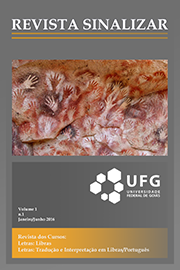O TEATRO COMO INSTRUMENTO PEDAGÓGICO NA EDUCAÇÃO DE SURDOS
DOI:
https://doi.org/10.5216/rs.v1i1.39646Resumo
Por ser uma arte de caráter fortemente visual, que aglutina todas as outras artes e linguagens, o teatro tem grande receptividade nas comunidades surdas e pode ser uma proposta pedagógica eficiente para melhorar o desempenho de alunos surdos e tornar sua educação mais interessante e significativa. O objetivo deste trabalho é trazer reflexões sobre os benefícios do uso do teatro na educação do surdo. A experiência dramática, levada à sala de aula, auxilia o desenvolvimento cognitivo e pode ser avaliada como um percurso, por meio do qual ocorre a transformação da interioridade do aluno surdo e também de sua realidade exterior. Para o desenvolvimento deste trabalho, foram essenciais as obras de Courtney e Reverbel, no que diz respeito ao teatro e à educação, assim como os textos de Freitas, que desenvolveu pesquisas sobre o teatro e a educação de surdos, apontando a importância das atividades de dramatização teatral, propostas em salas de aula, para motivar as práticas de linguagem escrita em Língua Portuguesa do aluno surdo e a redução dos entraves linguísticos entre surdos e ouvintes.
Downloads
Referências
BRASIL. Lei 10.436, de 24 de abril de 2002. Diário Oficial da União – publicado em 25 de abril de 2002; 181º da Independência e 114º da República. Brasília, DF: Senado, 2002. Disponível em: <http://www.planalto.gov.br/ccivil/leis/2002/L10436.htm>. Acesso em: 01 dez. 2015.
BRASIL. Parâmetros Curriculares para o Ensino Médio: linguagens, códigos e suas tecnologias. Orientações educacionais complementares aos Parâmetros Curriculares Nacionais. Brasília: MEC/SEB, 2002.
BRASIL. Decreto 5.626, de 22 de dezembro de 2005. Diário Oficial da União – publicado em 23 de dezembro de 2005; 184º da Independência e 117º da República. Brasília, DF: Senado, 2005. Disponível em: <http://www.planalto.gov.br/ccivil/_Ato2004-2006/2005/Decreto/ D5626.htm>. Acesso em: 01 dez. 2015.
COURTNEY, Richard. Jogo, teatro e pensamento. São Paulo: Perspectiva, 2003 (Col. Estudos).
FREITAS, Cilene Rodrigues Carneiro. Processo de compreensão e reflexão sobre iniciação teatral de surdos. 2014. 154 f. Texto base Dissertação (mestrado) – Universidade de Brasília, DF. Disponível em:
<http://repositorio.unb.br/06/1/2014_CileneRodriguesCarneiroFreitas.pdf>. Acesso em 08 nov. 2015.
GOLDFELD, M. A criança surda: linguagem e cognição numa perspectiva sociointeracionista. 3. ed. São Paulo: Plexus, 2002.
GRUPO SIGNATORES. Dica de Leitura. Disponível em: http://www.signatores.com.br/>
Acesso em: 16 nov. 2015
GUARINELLO, A. C. O papel do outro na escrita de sujeitos surdos. São Paulo: Plexus, 2007.
PERLIN, G. Identidades Surdas. In: SKLIAR, C. (Org.) A Surdez: um olhar sobre as diferenças. Porto Alegre: Editora Mediação, 1998.
QUASE9TEATRO. Disponível em: https://www.facebook.com/quase9teatro. Acesso em: 23 out. 2015
REVERBEL, Olga. Jogos teatrais na escola:atividades globais de expressão. São Paulo: Scipione, 1989.
RUDE, Teresa Cristina S.; GUERCHON, Paula. Teatro para Surdos: Uma abordagem de comunicação e expressão do não verbal ao verbal. Revista Arqueiro – Instituto Nacional de Educação de Surdos, Rio de Janeiro, vol. 6, dez. 2002. Disponível em: http://www.ines.gov.br/publicacoes/revista-arqueiro/arqueiro_06.pdf Acesso em: 23 de Nov. 2015
TBS BRASIL. Teatro Brasileiro de Surdos. Disponível em: http://tbsbrasil.blogspot.com.br/
Acesso em: 12 nov. 2015.
Downloads
Publicado
Como Citar
Edição
Seção
Licença
Autores que publicam nesta revista concordam com os seguintes termos:
Autores mantém os direitos autorais e concedem à revista o direito de primeira publicação, com o trabalho simultaneamente licenciado sob a Creative Commons Attribution License que permitindo o compartilhamento do trabalho com reconhecimento da autoria do trabalho e publicação inicial nesta revista.







 ISSN 2448-0797
ISSN 2448-0797